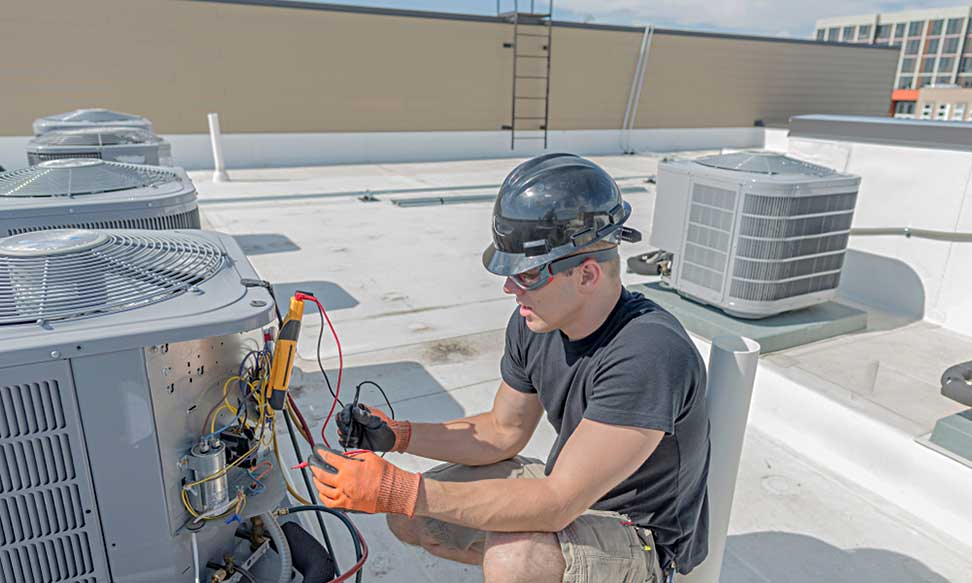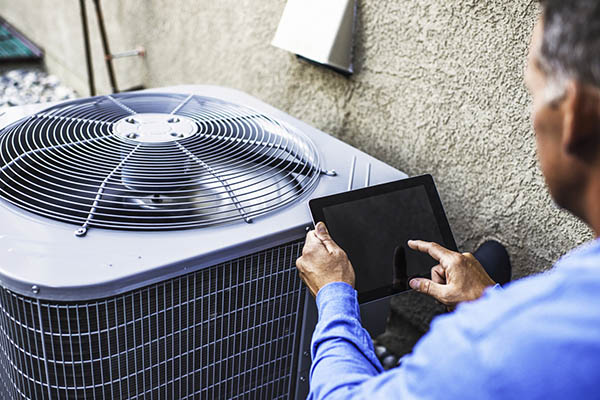Prevent Costly Repairs with Scheduled heat pump service
Prevent Costly Repairs with Scheduled heat pump service
Blog Article
Picking Between a Warm Pump and Heater: Secret Considerations for Your A/c Needs
When evaluating home heating alternatives for HVAC needs, the choice between a heatpump and a heating system can be intricate. Each system supplies unique benefits customized to particular climates and power performance objectives. Understanding these differences is crucial for making an enlightened choice. Secret aspects such as installation expenses and ecological impact additionally complicate the choice process. Which alternative really lines up with one's comfort and sustainability choices? The adhering to sections will certainly explore these factors to consider carefully.
Recognizing Warm Pumps: Just How They Work and Their Advantages
While many house owners consider numerous home heating alternatives, comprehending how heatpump feature and their advantages can significantly affect their decision. Heatpump run by moving warmth instead than generating it. In the winter season, they remove heat from the outside air or ground and move it inside, while in the summer, they reverse this procedure, cooling the home by getting rid of warmth outside. This double performance makes them flexible for year-round climate control.One of the primary benefits of heatpump is their power performance. They use significantly much less power compared to conventional home heating systems, potentially resulting in lower utility expenses (heat pump replacement ooltewah tn). In addition, heatpump have a smaller carbon footprint, making them an ecologically friendly option. They likewise need less maintenance than traditional systems, adding to long-lasting expense savings. Generally, recognizing the technicians and benefits of warmth pumps can aid homeowners make notified choices concerning their heating and cooling down requirements
Exploring Furnaces: Types, Operation, and Benefits
Furnaces come in various types, consisting of gas, electrical, and oil models, each with unique operational mechanisms. Comprehending these differences is important, as they influence performance and heating performance. In addition, heaters use various benefits, such as regular warm output and integrity in cooler climates.
Sorts of Heating systems
Heater can differ significantly in design and procedure, with heating systems being a popular option among home owners. There are a number of sorts of heaters, each using different gas sources and modern technologies. Gas heating systems prevail, leveraging gas to produce warmth successfully. Electric heating systems, on the other hand, make use of electric resistance to produce heat, usually preferred for their straightforward installment. Oil heaters, while much less common, work in areas with limited gas gain access to (heat pump installation ooltewah tn). Furthermore, condensing heating systems take full advantage of energy performance by capturing and reusing exhaust gases. Each kind operates with a system of warmth exchangers and ductwork to distribute warm air throughout a home. Understanding the distinctions in between these heater types is important for notified HVAC decisions
Advantages of Heaters
For property owners looking for reliable warmth throughout chilly months, the advantages of furnaces are considerable. Furnaces supply regular heating, making certain even temperatures throughout the home. They are especially reliable in severe cool, typically outperforming heatpump in freezing problems. Various kinds, including gas, electric, and oil heating systems, supply versatility to meet varied demands and preferences.Furnaces also tend to have reduced first installation expenses compared to warm pumps, making them a much more accessible choice for numerous. Their durable layout contributes to a longer lifespan, with several devices lasting over 15 years with appropriate maintenance. Additionally, modern heaters are frequently outfitted with sophisticated innovation for boosted efficiency, which can bring about decreased power bills. On the whole, furnaces remain a reliable selection for effective home heating.

Energy Effectiveness: Contrasting Warmth Pumps and Furnaces
When contrasting energy effectiveness between heat pumps and furnaces, the Seasonal Energy Effectiveness Proportion (SEER) plays a necessary duty in figuring out performance. Additionally, an operational price analysis exposes the long-term monetary implications of each system. Comprehending these elements can direct property owners in making educated decisions about their home heating remedies.
Seasonal Power Efficiency Proportion
Power efficiency plays a vital role in the decision-making process in between heatpump and heating systems, especially when taking into consideration the Seasonal Energy Performance Ratio (SEER) This statistics procedures the cooling efficiency of heatpump over an entire cooling period, providing a standardized way to examine performance. Greater SEER rankings suggest higher power performance, equating to lower energy usage and lowered utility costs. In comparison, furnaces are generally analyzed utilizing the Yearly Fuel Use Efficiency (AFUE) score, which shows home heating effectiveness. When contrasting these two systems, homeowners should focus on SEER rankings for heatpump, as they straight influence general power savings and ecological sustainability. An extensive understanding of SEER can especially influence the long-term satisfaction and cost-effectiveness of the picked cooling and heating service.
Operational Price Evaluation
Understanding the functional prices connected with warm pumps and furnaces is crucial for property owners reviewing their options. Warmth pumps typically offer greater power effectiveness, converting electrical energy right into heat with very little waste. This leads to reduced month-to-month energy costs, specifically in moderate climates. On the other hand, traditional heating systems, particularly gas models, may have lower upfront expenses yet can incur greater operational costs gradually because of fuel costs and efficiency ratings.Moreover, heatpump can operate as both home heating and cooling systems, potentially reducing the demand for separate HVAC systems. While first financial investments for heat pumps may be higher, their lasting financial savings in energy efficiency can make them an extra affordable option for lots of households. Cautious evaluation of regional energy rates check my source is necessary to determine the best option.
Installation Costs: What to Expect for Each Heating Unit
Installment costs for heating unit can differ significantly between warm pumps and heating systems, influencing house owners' choices. Heatpump usually have greater ahead of time installment costs, normally ranging from $3,500 to $8,000, depending on the device dimension and complexity of installment. This consists of the outside unit, indoor handling system, and necessary ductwork adjustments. Alternatively, heaters often tend to have reduced initial prices, balancing between $2,500 and $6,000, which can be appealing for budget-conscious home owners. Installation expenditures can boost if substantial ductwork is required.Moreover, the choice of fuel kind for heating systems-- natural gas, propane, or electrical-- can likewise influence installment expenses. While heat pumps provide energy efficiency, their first financial investment may hinder some customers. Inevitably, evaluating setup expenses along with long-term financial savings and efficiency will help property owners in making informed decisions regarding their heating systems.
Climate Factors To Consider: Which System Carries Out Much Better in Your Area
How do climate problems affect the effectiveness of furnace? The efficiency of heatpump and heaters can differ significantly relying on the local environment. In moderate climates, heatpump succeed by successfully transferring warm from the outdoors air, making them an energy-saving option. Their efficiency decreases in exceptionally cold temperatures, where they may battle to remove sufficient heat. Alternatively, furnaces, especially gas designs, provide trustworthy and consistent warmth despite outdoor conditions, making them more suitable in chillier regions.In areas that experience milder wintertimes, heatpump can run properly year-round, offering both home heating and cooling. In contrast, areas with extreme winters months frequently gain from the robustness of heaters. Ultimately, understanding the local climate is essential when choosing between a heatpump and a heater, as it straight impacts their functional effectiveness and overall performance.
Upkeep Demands: Long-Term Take Care Of Warm Pumps vs. Furnaces
While both heatpump and furnaces call for routine maintenance to assure peak performance, their specific demands and care regimens differ considerably. Furnaces normally need much less regular focus, with annual inspections being enough to inspect for gas leaks, clean filters, and assess general functionality. Their simpler design frequently enables simple repairs.In contrast, heat pumps require biannual upkeep as a result of their twin function in home heating and cooling. This includes cleansing coils, checking refrigerant degrees, and ensuring that both the indoor and exterior systems work at their finest. Furthermore, warm pump upkeep frequently entails more elaborate parts, making professional servicing essential.Neglecting upkeep can lead to decreased performance and increased energy expenses for both systems. Inevitably, property owners must think about these lasting treatment needs when choosing in between a heatpump and a furnace, as positive upkeep can expand the life-span and performance of either system considerably.
Environmental Effect: Choosing a Lasting Heating Choice
The ecological impact of furnace is a critical assessment for house owners looking for lasting choices. Heatpump are usually extra energy-efficient than traditional furnaces, as they move warmth as opposed to create it, substantially lowering carbon exhausts. By making use of renewable resource resources, such as air-source or geothermal heatpump, property owners can even more lessen their eco-friendly footprint.On the various other hand, gas heating systems release greenhouse gases and add to air pollution, though they commonly provide higher warm result. Developments in technology have actually led to the growth of high-efficiency heaters that minimize emissions.Ultimately, selecting a home heating system involves weighing efficiency against ecological effect. Homeowners are urged to assess local power sources and motivations for sustainable systems, guaranteeing a choice that lines up with both personal convenience and ecological responsibility. The choice affects not only prompt comfort yet additionally lasting sustainability and ecological wellness.
Often Asked Inquiries
For How Long Do Warm Pumps and Furnaces Normally Last?
The life expectancy of heat pumps normally ranges from 15 to twenty years, while furnaces can last in between 15 to thirty years. Routine maintenance substantially impacts their longevity and performance in providing home heating services.
Can I Utilize a Heat Pump in Very Cold Climates?
Warm pumps can run in exceptionally cold environments, however their effectiveness lessens as temperatures decrease. In such conditions, supplementary heating resources might be necessary to preserve comfortable interior temperatures and assure peak performance.

What Is the Noise Degree of Warmth Pumps Versus Furnaces?
The noise degrees of warm pumps and furnaces differ substantially. Usually, warmth pumps run more next page quietly than conventional heating systems, making them more effective for those conscious seem, while furnaces might produce louder operational noises throughout home heating cycles.
Are Heat Pumps Suitable for Both Cooling And Heating?
Warm pumps are without a doubt suitable for both heating & cooling (heat pump replacement ooltewah tn). They function by transferring warm, offering efficient temperature control year-round, making them a versatile choice for house look here owners looking for an all-in-one heating and cooling solution
What Size Heating Unit Do I Need for My Home?
Establishing the appropriate dimension furnace for a home needs reviewing aspects such as square footage, insulation quality, neighborhood climate, and the home's design. Consulting a professional can assure an accurate assessment and suitable convenience. Warm pumps normally offer higher power performance, converting electrical energy into warm with very little waste. In modest climates, heat pumps stand out by efficiently moving warmth from the outdoors air, making them an energy-saving alternative. Alternatively, heaters, especially gas models, provide dependable and consistent warm regardless of outside conditions, making them more effective in chillier regions.In locations that experience milder winter seasons, warm pumps can run effectively year-round, offering both heating and cooling. Warm pumps are generally extra energy-efficient than typical furnaces, as they transfer warmth instead than generate it, significantly lowering carbon emissions. By making use of renewable energy resources, such as air-source or geothermal warm pumps, house owners can further decrease their eco-friendly footprint.On the various other hand, natural gas heating systems release greenhouse gases and add to air pollution, though they typically provide higher heat result.
Report this page